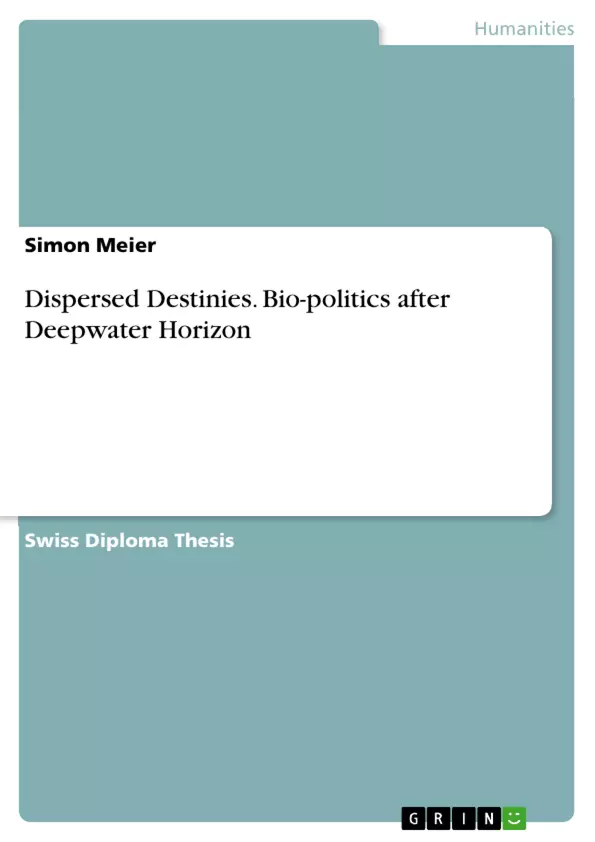The story about the impacts of the Deepwater Horizons oil spill is one of ongoing health problems that will likely continue into the future. The fast dispersion of oil at the spill site is juxtaposed with the long-term health impacts caused by chemical exposure. People affected continue to fight for redress, demanding free treatment facilities and financial compensation. They build their claims on a damaged biological integrity, contesting notions of state and corporate responsibility. Worries about future chronic epidemics in the form of cancer are widespread. Posttraumatic stress shouldn’t be neglected in this case, but neither should physical health problems. The impacts of the Exxon Valdez oil spill, which had tremendous outcomes on the people who worked in the clean up, is an example of how physical health impacts are an issue that need to be taken seriously.
Inhaltsverzeichnis (Table of Contents)
- Introduction
- Petro-state politics
- Shrimp and petroleum: An ambiguous relationship
- Petro-state citizens
- The deregulation of industry practices
- Creating dispersed destinies
- An illegitimate illness
- Bio-politics between pastoral power and neoliberal governmentality
- Public portrayal and personal impacts
- Biological citizenship and the human right to health
- Conclusions
Zielsetzung und Themenschwerpunkte (Objectives and Key Themes)
This work aims to examine the social and political consequences of the Deepwater Horizon oil spill in the Gulf of Mexico. It explores how the spill has impacted the lives of coastal residents and the ways in which the event has exposed underlying structures of power and responsibility within the petro-state.
- The relationship between shrimping and the oil industry in Louisiana
- The impact of the spill on the health of Gulf Coast residents and the denial of chemical exposure
- The role of bio-politics and neoliberal governmentality in shaping responses to the spill
- The concept of biological citizenship and the human right to health in the context of environmental disasters
- The ways in which the spill has revealed hidden power structures and work processes within the oil industry
Zusammenfassung der Kapitel (Chapter Summaries)
The introduction establishes the context of the Deepwater Horizon oil spill and its significance as a case study for understanding the intersection of power, industry, and public health. The chapter highlights the media's focus on visible impacts while neglecting the hidden consequences of oil dispersants and subsurface pollution. It introduces the concept of "externalities" and raises questions about corporate responsibility and the commodification of environmental conditions.
The second chapter examines the intricate relationship between shrimping and the oil industry in Louisiana. It explores how these seemingly contrasting activities are deeply intertwined, impacting the livelihoods and well-being of coastal residents.
Chapter three delves into the biological and social consequences of the spill, focusing on the denial of chemical exposure and the emergence of a health crisis among Gulf Coast residents. It analyzes the interplay of bio-politics, neoliberal governmentality, and the concept of biological citizenship in shaping responses to the crisis.
Schlüsselwörter (Keywords)
The main keywords and focus topics of this work include: Deepwater Horizon, oil spill, Gulf of Mexico, petro-state, bio-politics, neoliberal governmentality, biological citizenship, human right to health, chemical exposure, environmental disasters, corporate responsibility, shrimping, oil industry, Louisiana, coastal communities.
Frequently Asked Questions
What are the long-term health impacts of the Deepwater Horizon oil spill?
Affected residents suffer from persistent health issues caused by chemical exposure, including respiratory problems and skin conditions, as well as long-term concerns like cancer and post-traumatic stress.
What is the concept of "biological citizenship"?
Biological citizenship refers to how individuals build social and political claims based on their damaged biological integrity, demanding redress and healthcare from the state or corporations.
How did the oil spill affect the shrimping industry in Louisiana?
The spill created an ambiguous relationship between the petroleum and shrimping industries, as many fishermen lost their livelihoods while simultaneously being hired for clean-up operations.
What role does "neoliberal governmentality" play in the spill's aftermath?
It describes how corporate and state responses prioritized economic interests and deregulation over public health and environmental accountability.
Why is the denial of chemical exposure significant in this case?
The denial by official entities makes it difficult for victims to receive financial compensation and specialized medical treatment, leading to an "illegitimate illness" status.
- Quote paper
- licentiatus philosophiae Simon Meier (Author), 2012, Dispersed Destinies. Bio-politics after Deepwater Horizon, Munich, GRIN Verlag, https://www.grin.com/document/276223



